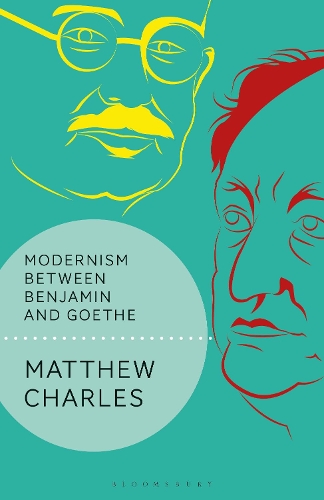
Modernism Between Benjamin and Goethe
(Paperback)
Publishing Details
Modernism Between Benjamin and Goethe
By (Author) Matthew Charles
Bloomsbury Publishing PLC
Bloomsbury Academic
17th June 2021
United Kingdom
Classifications
Tertiary Education
Non Fiction
Literary theory
Western philosophy from c 1800
193
Physical Properties
Paperback
240
Width 156mm, Height 234mm, Spine 12mm
320g
Description
Widely regarded as one of the foremost cultural critics of the last century, Walter Benjamins relation to Modernism has largely been understood in the context of his reception of the aesthetic theories of Early German Romanticism and his associated interest in avant-garde Surrealism. But this Romantic understanding only gives half the picture. Running through Benjamins thought is also a critique of Romanticism, developed in conjunction with a positive engagement with the philosophical, artistic and historical writings of J. W. von Goethe. In demonstrating the significance of these Goethean elements, this book challenges the dominant understanding of Benjamins philosophy as essentially Romantic and instead proposes that Goethes Classicism, conceived as the counterpoint to Romanticism, permits a corrective to the latters deficiencies. Benjamins Modernist concept of criticism, it is argued, is constituted in the movement between these polarities of Romanticism and Classicism. Conversely, placing Goethes Classicism in relation to Benjamins practice of literary criticism reveals historical tensions with Romanticism that constitute the untimely indeed, it will be argued, cinematic Modernism of his work. Adopting a transcritical approach, this book alternates between Benjamin and Goethe in relation to the experiences of colour, language and technology, assembling a constellation of philosophical and artistic figures between them, including the writings of Kant, Nietzsche, Cohen, Deleuze, Koselleck, Klages, and the work of Grnewald, Mares, Klee, Turner, Hulme, Eisenstein, Tretyakov, and Murnau.
Reviews
Modernism Between Benjamin and Goethe is an exhilarating assembling of voices. At its core is Goethe speaking across a century to Benjamin. Poles apart, such tensity leads to attraction, expressed in multiple affinities; divided by time, while untimeliness transfers energy to the analysis. Matthew Charles symphonizes beautifully this convocation of the Romantic, the Classical and the Modern. * Esther Leslie, Professor of Political Aesthetics, Birkbeck, University of London, UK *
In this well-informed and wide-ranging investigation, Matthew Charles presents a complex Goethean perspective for the reading of Walter Benjamin and for modernist studies generally. His is a Goethe who has passed through the afterlives of Romanticism, making possible a post-romantic classicism positioned beyond the classical antinomies. * Howard Eiland, Lecturer in Literature, Massachusetts Institute of Technology, USA *
Author Bio
Matthew Charles is a senior lecturer in cultural and critical theory at the University of Westminster, UK. He is the co-author of the Stanford Encyclopedia of Philosophy entry on Walter Benjamin and several articles and chapters on critical theory and education.
